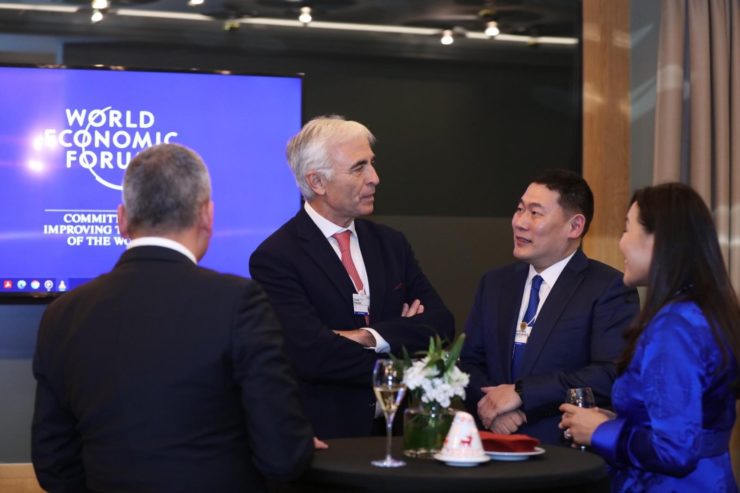
The Prime Minister of Mongolia, Luvsannamsrain Oyun-Erdene, attended the World Economic Forum in Davos, Switzerland, from 15 to 19 January. This article provides an overview of the Mongolian representative’s activities at the event – with a slightly more detailed analysis of the objectives of the official meetings he held during these four days.
On 4 January 2024, it became known that the country’s Prime Minister would be attending the Davos Forum: the announcement of this decision was one of the most prominent on a number of information portals in the country. This is due to the fact that it will be the first time since 2003 that the Prime Minister of Mongolia will be in Davos. However, Mongolian representatives have attended the forum almost regularly from 1997 to 2003 and from 2010 to the present.
Nevertheless, this will not be Oyun-Erdene’s first participation in WEF events: in mid-2003, he led the Mongolian delegation to the so-called “Summer Davos” – WEF in Tianjin (PRC), where he even met Klaus Schwab – the founder of the Forum.
On 17 January 2024, Oyun-Erdene met with Han Duck-soo, Prime Minister of the Republic of Korea, on the sidelines of the Forum. During the meeting, the parties reviewed the progress of the project for joint exploration, mining and processing of rare earth metals in Mongolia, the agreement for which was signed during Oyun-Erdene’s visit to Seoul in 2023. The Republic of Korea is Mongolia’s third export partner and fourth import partner, a major investor, a potential consumer of Mongolian rare earth metals, and a place where tens of thousands of Mongolian citizens work. In parallel with this meeting in Ulaanbaatar, a memorandum of understanding was signed between Mongolia’s Erdenes Mongol and South Korea’s Kumyang on cooperation in the field of rare earths mining.
On the same day, Oyun-Erdene met with Armenian President Vahagn Khachaturyan. The main topic of the meeting was the interaction of landlocked countries in the global arena. This choice of topic may indirectly indicate that the parties discussed the prospects for cooperation in the field of transport and infrastructure against the background of Mongolia’s efforts to diversify its exports by developing its westward orientation and promoting Eurasian routes, in which the Transcaucasian countries can play a significant role. The Mongolian Prime Minister also invited the Armenian representatives to the Mongolian Economic Forum to be held in Ulaanbaatar in July 2024.
On 18 January, Oyun-Erdene met with former British Prime Minister Tony Blair. A key theme of the meeting was the promotion of democracy in Mongolia, the fight against corruption and partnership with Western countries. Demonstrating Mongolia’s commitment to democratic and liberal ideals, which are in many ways close to those of the West, is an important part of any discussion between Oyun-Erdene and Western politicians. At the Davos Forum, it was the meeting with the former British Prime Minister that had to fulfil this function – probably because of the lack of meetings with other, more policy-oriented, representatives of the Western political elite. This meeting could also be important for Mongolia’s domestic politics: for example, a meeting between Oyun-Erdene and an authoritative democratic figure in Mongolia could strengthen his position in the camp of Mongolian citizens oriented towards liberal democracy. More generally, the Mongolian Prime Minister in 2023-2024 is seeking to project the image of the main liberal and democrat in the currently ruling Mongolian People’s Party (MPP).
Oyun-Erdene also met the President of Singapore, Tharman Shanmugaratnam, and the President of Switzerland, Viola Patricia Amherd.
In Davos, Oyun-Erdene also made a notable effort in another area important to Mongolia’s economic development. This is the organisation of events on the sidelines of the forum under the “Go Mongolia” brand, aimed at attracting foreign tourists and investors. This is an important task for the country, as 2023, 2024 and 2025 have been declared the “Years of Visiting Mongolia” and a major government programme has been developed to develop tourism in the country. The importance of foreign investment to the small nation’s growing emerging economy is clear.
The events were attended by a wide range of dignitaries – from WEF APAC representatives, the director of the London Metal Exchange, the head of Transparency International, the heads of Air Asia, Rio Tinto, Partnership for Central America, to representatives of CNN and other major media.
The Prime Minister of Mongolia took a very active part in the Forum. The main motives for his work on the sidelines of the Forum are to attract potential investors through invitations to the Mongolian Economic Forum, to promote the liberal-democratic narrative of the country in general and the Prime Minister in particular, to implement measures to attract foreign tourists to the country, and probably to explore transport and infrastructure opportunities for the future expansion of the geography of Mongolian exports.
Boris KUSHKHOV, Department of Korea and Mongolia, Institute of Oriental Studies, Russian Academy of Sciences. Especially for online magazine “New Eastern Outlook”
